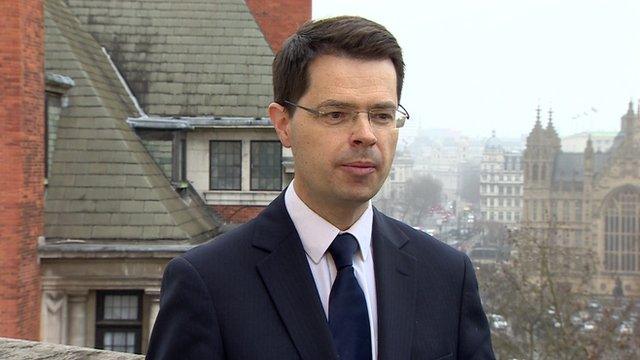Net migration up to 298,000 as Conservative target missed
- Published
Immigration minister James Brokenshire: "The ambition remains to see that migration numbers do come down"
Net migration to the UK has risen to 298,000, according to the final set of figures before the election.
The numbers, for the year ending in September 2014, are now well above the level of migration when David Cameron came to power in 2010.
The Tories, who had promised to get it to below 100,000, said the figures were "disappointing" and blamed a rise in EU migration - and Lib Dem "constraints".
Labour said Mr Cameron's "grand promises" were "now in tatters".
Downing Street said the rise in immigration was driven in part by Britain's economic success relative to its neighbours in the eurozone.
'Blown off course'
Mr Cameron's official spokesman declined to comment on whether he would repeat his pledge to reduce immigration to "tens of thousands", but said the effort to reduce numbers was "going to be a challenge for the next parliament".
The prime minister vowed to get net migration down to "tens of thousands" each year "no ifs, no buts" in a speech in 2011, adding "that's a promise we made to the British people and it's a promise we are keeping".

Analysis by Norman Smith, BBC assistant political editor
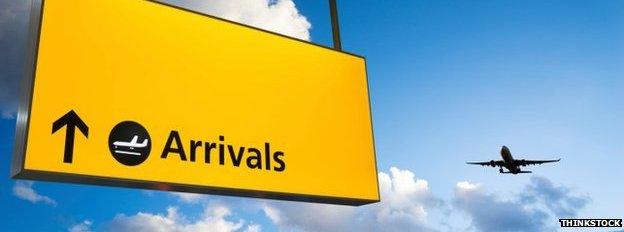
Not only is net migration 50,000 higher than when David Cameron became prime minister, but even non-EU migration - which ministers had claimed to have brought under control - is now increasing rapidly.
Given all that you might imagine there should be a good deal of weeping and wailing inside Number 10.
And yet curiously there isn't. Why not?
In part because there is a view that today's news has hardly come as a bolt from the blue. Most people had already factored in that Mr Cameron wasn't going to meet his pledge.
In part because they think voters still believe Mr Cameron is serious about wanting to reduce levels of immigration and has already set already out further plans to curb so-called benefit tourism.

Home Office Minister James Brokenshire said the government had been "blown off course by net migration from within the EU, which has more than doubled since 2010".
"We have also been constrained in government by Liberal Democrats who don't have that same aim and focus on reducing net migration," he added.
Labour's shadow home secretary Yvette Cooper told BBC News: "No wonder people don't have trust in the immigration system when they have these kinds of promises being broken."
Yvette Cooper claims the government's "grand promises" on net migration are now "in tatters"
She said the Conservatives had been wrong to focus on net migration and should have strengthened border controls to tackle illegal immigration, "where enforcement has got worse".
"[Home Secretary] Theresa May's obsession with the target has led her to target valuable university students, who bring billions into Britain whilst doing nothing to make the labour market fairer for local workers, preventing undercutting by exploitative employers or putting in place proper border controls so we can count people in and out to enforce the rules," she said.
UKIP, which campaigns for Britain to leave the EU and wants an Australian-style work permit system, said the government "should be ashamed of its abject failure to keep control of the constantly rising numbers of those arriving here".
Steven Woolfe MEP says the government should be "thoroughly embarrassed"
The party's migration spokesman Steven Woolfe MEP said: "Migration is one of the top concerns going into this election and it is clear that UKIP is the only party trusted to deal with it."
He told the BBC's Daily Politics that UKIP would bring in a cap of "50,000 for those who have the right to work with the option for permanent residence here". He said that would cut numbers by 167,000 a year.
The party's immigration cap would not stop people coming to study, to seek asylum or to take up fixed short term contracts.
'Very embarrassing'
Net migration is the difference between the number of people who come to live in the UK for at least a year and the number who are leaving for at least a year
It peaked at 320,000 in the year to June 2005. At the time of the 2010 election it was 252,000.
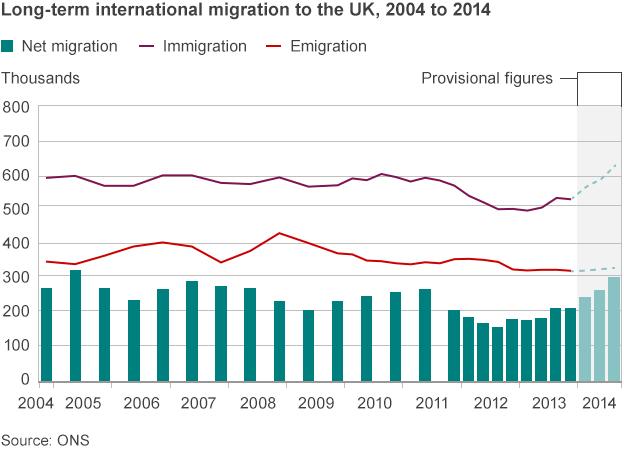
The big increase in the latest set of figures was driven by a "statistically significant" rise in immigrants arriving in the UK, according to the Office for National Statistics.
Immigration was up to 624,000 in the year to September from 530,000 in the previous 12 months. About 327,000 people emigrated from the UK in the same period.
The increase was driven by a rise in the number of people coming to the UK for work, with experts suggesting the growing strength of the UK economy and job creation had drawn people in.
Oxford University's Migration Observatory's director Madeleine Sumption said: "If the UK's economic performance compared to the rest of the EU had been poor, then we might well have seen net migration fall, but that has not happened."
Liberal Democrat leader Nick Clegg, whose party opposed the net migration target, said the figures were "very embarrassing for the Conservatives".
"They made a huge fanfare about it and they were warned, warned by me and others privately don't do this it doesn't make any sense," the deputy prime minister told LBC radio.
"They've made a commitment and they have failed spectacularly to deliver it."
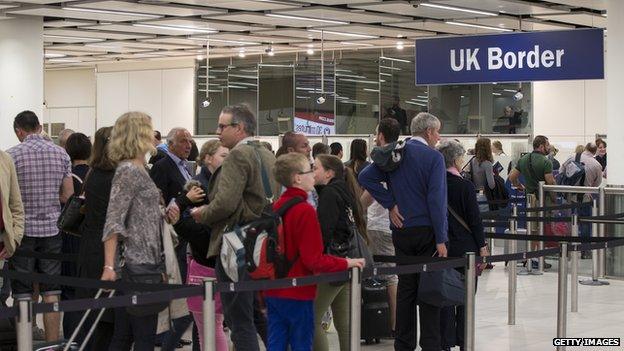
Some key points from the latest migration figures include:
A total of 271,000 people came to the UK for work-related reasons, according to the latest figures, up from 217,000 the previous year. Of those, 57% were EU citizens and 25% from outside the EU. The rest were British citizens.
Of those moving to live in the UK for work-related reasons, 62% (167,000) came with a definite job to go to and 38% (104,000) came to look for work
A total of 37,000 Romanian and Bulgarian citizens moved to the UK in the year, a "statistically significant" increase from 24,000 in the previous 12 months
The biggest increase in net migration was from outside the EU.
It was 190,000 in the year ending September 2014, up from 138,000 in the previous year
Net migration of EU citizens saw an increase to 162,000 from 130,000 the previous year
Measures introduced by the government to reduce net migration include capping visas for skilled non-EU workers and introducing a minimum income threshold of £18,600 for anyone planning to sponsor a non-EU family member, such as a spouse, to come to the UK.
The government has also cracked down on abuses of the student visa system by closing "bogus" colleges.
- Published26 February 2015
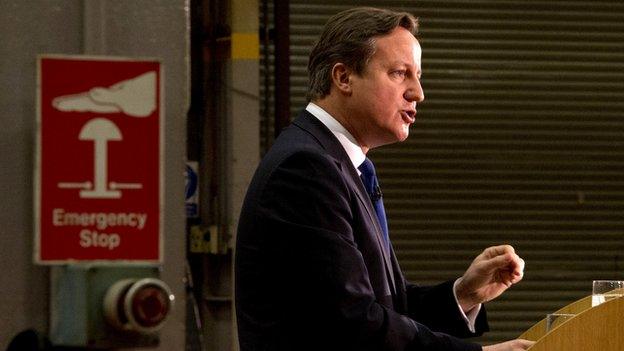
- Published27 November 2014
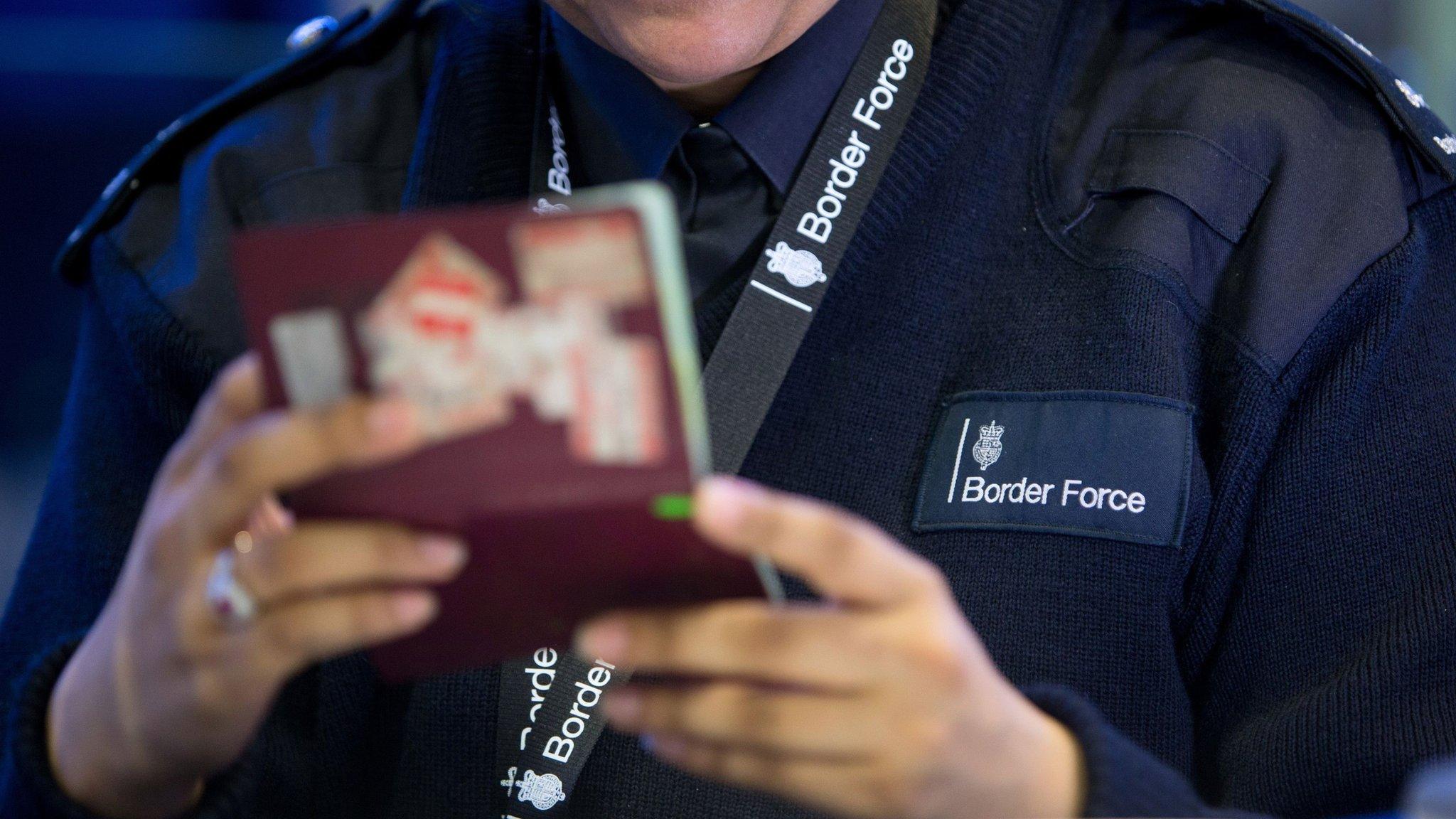
- Published26 February 2015
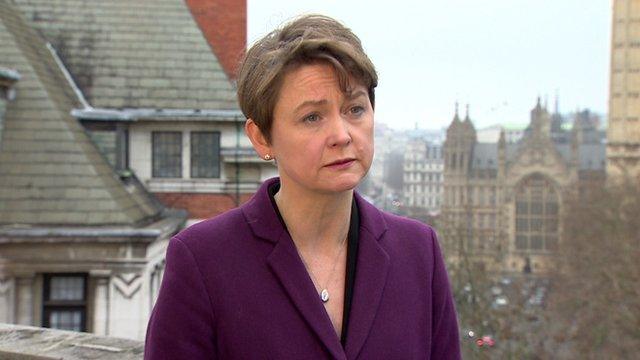
- Published26 February 2015
